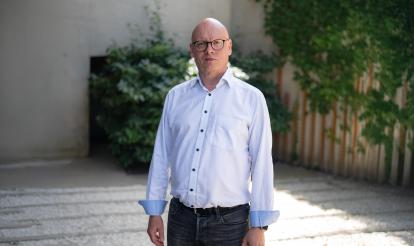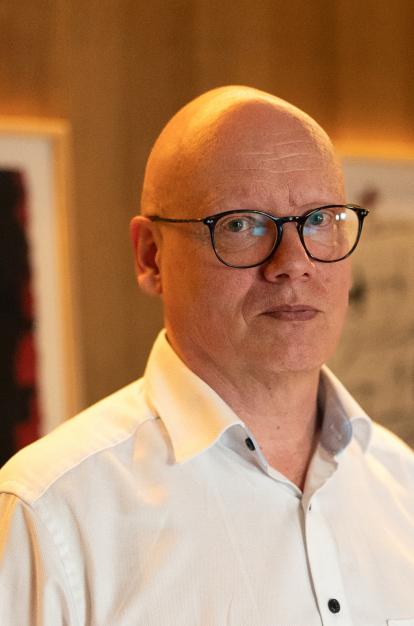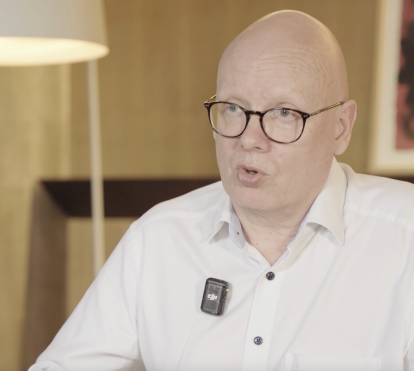
You are reading:

You are reading:

Send your questions to:
With the arrival of artificial intelligence, traditional concepts such as the transmission of knowledge and student assessment are being reconsidered. We are being told that education is on the brink of a radical transformation. But how might such a revolution affect the role of teachers and the learning process as a whole?
We spoke with Ilkka Tuomi, philosopher, computer scientist and expert in ethics, the philosophy of innovation and artificial intelligence, as well as a pioneer in reflecting on the impact of technology on education. Tuomi shares his vision of the potential role of artificial intelligence in education. The expert, who was a speaker at the AIHUB Summer School organised by the CSIC’s AIHUB and the ”la Caixa” Foundation at CaixaForum Zaragoza, argues that “one of the aims of education is to help us become people with a voice of our own”.

I’ve never been a specialist, but I’ve never been afraid to ask questions, and that has allowed me to move flexibly across different fields. I’ve always been interested in multiple disciplines, especially AI. When I was studying theoretical physics, I was drawn to living systems and complex systems. That led me to explore both kinds of artificial networks – neural networks and AI. I also became deeply interested in philosophical questions, because once you start talking about human intelligence and knowledge, you inevitably begin to ask what knowledge is, what perception, memory and thought are, and so on.
One of the most interesting philosophers of AI for me is Henri Bergson, because he didn’t approach thought and cognition from the perspective of representing reality, but rather from the way different biological beings operate and act within their environment. For him, intelligence is, in a sense, a solution to a practical problem, not something philosophers do while sitting at their desks thinking abstract thoughts. It marked a turning point at the end of the 19th century, because philosophy in Europe until then had been understood as the contemplation of abstract concepts. This view of intelligence, rooted in biology and evolution, is now re-emerging in the field of artificial intelligence.
It’s promising that some of the trends we should be most concerned about in AI and education are, in fact, losing popularity.
Take, for example, the idea that AI is going to revolutionise education by enabling personalised learning. In my view, that idea is outdated. From this perspective, education is seen purely as the internalisation of knowledge. So, if you have a book and the goal is to transfer its content into the student’s mind, you can adapt it to make it as easy as possible for that particular student.
However, I’m glad that there’s now more discussion around the idea that education shouldn’t just be about transmitting a set of information found in a book. Firstly, because these technologies mean that this kind of knowledge no longer resides solely in humans. You’re no longer “needed” for your knowledge if someone can just type a question into the internet or ChatGPT and get an answer. But of course, it’s still necessary for you to know things. So? Well, what’s truly interesting is the internalisation of that knowledge, the learning process itself.
Now, in the field of education, we’re starting to consider how AI can be used to improve the learning process itself. It’s not about transferring existing knowledge into students’ heads, but about supporting their learning processes, making them stronger, more meaningful, more connected, as I mentioned earlier, to their environment and to the world in which the student will take action.
Education goes beyond learning. It has social functions, as it enables us to be part of society, to participate in it and to change it. One of its roles is emancipatory (transformation and development), and another is conservative (passing on our history, culture, etc.). In addition, it also plays a qualifying role, certifying skills and helping to build social trust by confirming that a person is prepared to take on certain professional roles, such as pilot, engineer or doctor.
Artificial intelligence and cognitive technologies help strengthen the idea that the role of education is not only to transmit knowledge, but centrally to develop human agency – our ability to make decisions and act with purpose. We need to rethink education and consider how to use AI to enhance our capacity to be active participants in the real world. This also means questioning how these technologies are reshaping social structures such as the economy and the job market.

At present, teachers have very little agency when it comes to AI, at least in the way it’s currently structured, as it’s controlled by large commercial players. If you don’t use it, there’s a fear that you risk being left behind.
Compulsory education used to be aligned with social goals and was overseen by policymakers. Culture and the political process determined what should be included in the curriculum and so on. Now, that democratic process has broken down. Technological power is so great, and so concentrated and controlled, that people say: “We have no choice but to adapt to this revolutionary technology”.
It’s important to reclaim our ability to act. We need to truly believe that technology only exists if we use it, and that it will exist in the way we choose to use it. It’s up to us to decide what we want to do with AI. Education can help here too, in terms of artificial intelligence literacy to support the development of these technologies in the hands of communities. In this sense, it also helps us grow as individuals with our own voice, capacity to act and critical thinking skills.
There’s a lot of hype surrounding these technologies. Everyone is talking about them, and there’s enormous pressure on teachers to do something with AI. It’s crucial to support them in developing their skills and competencies so they can understand the right way to use these technologies in an educational context. Not just to adapt to existing tools, but also to reflect on their possibilities and contribute ideas for introducing new ones, alternatives to those offered by the big tech companies. This, of course, requires some form of basic AI literacy. It’s not overly complicated; it can be learned in a week, but teachers need time and resources. Technology evolves so quickly that as soon as you’ve learned something, the next week there’s already something new. That’s why I believe we need to protect teachers from pressure and haste. When circumstances are urgent, we need to sit down and think. Haste is never a good advisor.
I believe that in the future, schools will become a kind of nerve centre for the knowledge economy, for innovation, and for social change. In part, because they can bring together resources and spaces where people can meet and do things together.
We often think of innovation as something that happens when one person has a great idea. But real innovation takes place when many people use these new technical opportunities and integrate them into their social practices. It has a lot to do with bottom-up processes, where people learn to make sense of new technical possibilities. It’s not something done by a single person; it’s about creating meaning, knowledge and social learning. Educational institutions like schools can become this kind of community.
Two years ago, most people became aware that something called AI existed. It was quite a shock, because ChatGPT appeared to be intelligent and capable of doing interesting things. People immediately started trying to use it for everything, and students began writing essays and doing their homework with ChatGPT. Teachers panicked. Their system was falling apart because they could no longer tell whether students had actually done the work themselves.
In a few years, the story will be different. In the future, the education system will be much more like that of the Nordic countries, where homework is more about helping students learn and less about evaluating or ranking them. Homework is important for getting students involved in their learning process; for example, when writing an essay, you learn how to think and structure your ideas. But grading those tasks to assess whether students have internalised the knowledge… that part is going to disappear. What matters isn’t the marks, but motivating and engaging students. We need to think about how to use artificial intelligence to improve the learning process. When writing an essay, for instance, AI can help students develop their ability to think, articulate and express their thoughts. And we need to rethink the assessment system.

We know very little about the impact of these technologies on cognitive development. We also have limited understanding of their social and political impact. Today’s children are growing up in an environment very different from that of our childhoods. They communicate online, play and do many other things at the same time. We know these technologies have an impact, but we don’t yet know whether it’s positive or negative. We need to be aware that there are both risks and opportunities. And we need to understand the concepts and language to talk about it, including the ethical implications of AI. Children are already talking about privacy, the power of big AI companies, fake news on TikTok and not believing everything you read. They’re adapting to this kind of environment, and teachers are already beginning to address these issues in practice. We’re all learning.